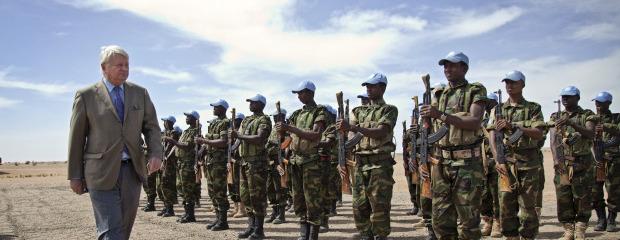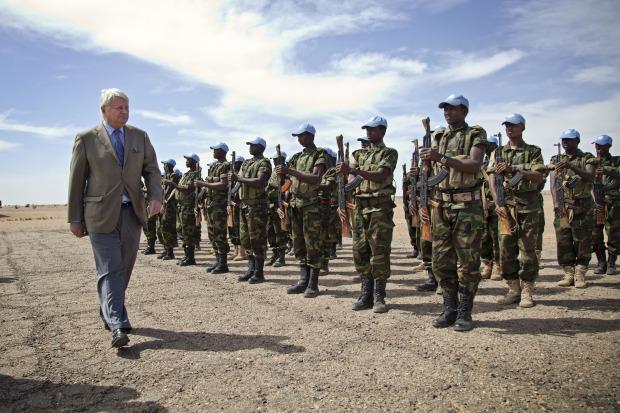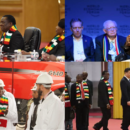How Africa’s political regimes legitimate themselves through the fight against terrorism – By Hans De marie Heungoup


Chadian troops of the UN Multidimensional Integrated Stabilization Mission in Mali (MINUSMA) are reviewed by Hervé Ladsous, Under-Secretary-General for Peacekeeping Operations.
Terrorism has been gaining ground in sub-Saharan Africa in the last decade. This does not mean that terrorism was non-existent in the region before this (the Lord’s Resistance Army was formed in Uganda in around 1986), but the formation per se of Sub Saharan organisations and their self-identification as terrorist groups is a relatively recent phenomenon. Whilst the rise of terrorism has increased instability in several states on the continent, it is also evident that some regimes have used the fight against terrorism for their own political ends.
This article assesses the impact of the fight against terror in Sub Saharan Africa on the legitimacy of several regimes. It highlights the fact that the fight against terrorism is a political investment for several leaders who have successfully used it as a tool to buttress their own legitimacy. This political exploitation is seen both in countries directly affected by terrorism such as Kenya and Cameroon, but also in countries that are indirectly involved, such as Chad.
Political exploitation: From Cameroon to Kenya
In Cameroon, the fight against Boko Haram, which began in 2013 and intensified from May 2014, has contributed to the re-legitimisation of President Paul Biya on the international scene; helping him to mount pressure on the opposition and civil society in the country.
After being re-elected for the seventh time in October 2011, an election that was plagued by many irregularities, Biya seemed isolated on the international scene. Post-election, he was neither congratulated by France, nor the European Union, let alone the US. Whereas the Cameroonian president usually travels to France after his election, after the 2011 poll, he had to wait until January 2013 to be received by Francois Hollande. French and American Heads of State and Government did not accept the official invitations by President Paul Biya to visit Cameroon. They did however find the time to visit neighbouring countries during the same period.
In 2013 Francois Hollande announced the end of “˜Francafrique’ (something his predecessor, Nicolas Sarkozy, had also been keen to stress), whilst US President Barack Obama, for his part, declared that Africa did not need strong men, but instead required solid institutions. During the 20th May celebration in 2011 and 2012 (which commemorates the unification of Cameroon), American and French presidents chose to send their messages of congratulations to the youth and civil society, whereas usually these congratulations were sent to the Cameroonian Head of state.
However, Biya seems to be gradually regaining international stature in the face of the Boko Haram threat in the north of his country. In fact, with the kidnapping of the Tanguy Moulin Fournier family (who are French) in February 2013 in the far-North of Cameroon, France had no other option but to collaborate with Biya. The Cameroonian president availed himself of this opportunity to strengthen relations with Paris by throwing all his weight behind the negotiations to secure the release of French hostages.[1] Franí§ois Hollande personally thanked him and Laurent Fabius travelled to Yaoundé to take the hostages back to France.
The same scenario played out during the abduction of the French priest Gorges Vandenbeusch in November 2013, then two Italian priests and a Canadian nun in April 2014. Moreover, Cameroon’s military successes against Boko Haram, unlike neighbouring Nigeria, have contributed to Biya’s international credibility.
Cameroon also shares a border with the Central African Republic, enabling it to emerge as an indispensable partner in the settlement of this conflict. This is not only the case on a logistical level – most of the equipment of the French operation Sangaris and MINUSCA goes through Cameroon – but also Cameroon has sent 850 troops to the CAR and the commander of the MINUSCA force is Cameroonian.
Similarly, in June 2013 Cameroon organised a regional summit on maritime safety and security in the Gulf of Guinea. The logical fallout of this involvement of the Cameroonian leader in security issues has been his mainstreaming on the international scene which is seen through messages of congratulations sent to him on 20 May 2014, as well as his invitation to the White House in August 2014 in the framework of the Africa – USA summit.
At the internal level, the fight against Boko Haram has helped to bring unity among politicians. Military successes by the army have generally galvanised Cameroonians to support the government’s policy to fight Boko Haram. However, in the name of the fight against Boko Haram, the regime has arrested and harassed reporters and civil society leaders who are openly critical of the government.[2] Moreover, the ill-judged speech by Biya in August 2014, in which he likened Boko Haram’s terrorists to Cameroonian nationalists of the 1950s and 60s aroused consternation amongst the opposition and civil society.
Lastly, a recently adopted anti-terrorism law has attracted criticism from the opposition and civil society that see it as being hurriedly drafted to prevent a Burkinabé -like scenario. Whilst not explicitly its intention, the law could be applied to political parties and civil society organisations that organise a strike or protest without the prior authorisation of the Divisional Officer (such authorisations are systematically rejected).
Section 2 of the law considers as a terrorist act the disruption of the functioning of public services. This means that for any demonstration that may grow out of control, demonstrators can be sentenced to death. This law is also criticised for the severity of the punishment incurred, the death penalty, without recourse for appeal.[3]
In Kenya, Uhuru Kenyatta, elected in March 2013, emerged stronger after the attack by the terrorist group Al Shabaab against the Westgate shopping mall in September 2013 that left 67 people dead and injured 240 others. Though he lost his nephew in the attack, his strength and ability to rule during those moments enabled him to buttress his political position under the banner of national unity.
The attack also strengthened his position in the face of the International Criminal Court (Kenyatta was being tried for alleged crimes committed during the 07/08 Kenyan election) the opening hearing of which was held two months after Westgate. The political impact of the hearing was quite minimal since the country was still in something of a state of shock.
Allowances were also made for Kenyatta in his position as President of a country experiencing a period of domestic uncertainty; he was for example relieved of the obligation of being present in several hearings at the ICC. His position was all the more strengthened as he could stand as the guarantor of Kenyan unity.
The collapse of the ICC prosecution of the president in December 2014 was mainly the result of the refusal of key witnesses to testify and the lack of collaboration by the Kenyan administration with the ICC – such as the president’s financial declaration in 2007 – but it should be noted that the position of the Head of state at war against terrorism adopted by Uhuru contributed to discouraging the ICC from continuing proceedings.
After Westgate, despite the multiplication of attacks attributed to Al Shabaab at the coast, in the North east of the country and in Nairobi, criticisms were rather directed to his aides: the head of the intelligence service, the police chief, Minister of Interior and army chief of staff. Even criticisms made by human rights organisations on the blunders of the Kenyan army did not specifically target the president.
It was only after the attacks of Mpeketoni and Mandera, and the “˜tumechoka’ protests in early December 2014 that criticisms by the opposition Coalition for Reforms and Democracy (CORD) targeted the president for the first time. These criticisms did not however undermine his credibility much; by firing the country’s intelligence chief, Interior Minister and Police chief, Kenyatta succeeded in indicating that blame should be directed elsewhere.
Chad
Idriss Deby Itno of Chad is probably the African leader to have reaped the most from his involvement in the fight against terrorism. Chad’s military intervention in Mali in January 2013 when Bamako was threatened by AQIM (Al Qaeda in the Islamic Maghreb) and ECOWAS stuck in crisis meetings, enabled president Deby to gain credibility at the international level. By deploying 2,400 troops, the biggest African contingent, Chad significantly contributed to the defeat of AQIM, including in areas where fighting was the most violent: Kidal, Gao and the Ifoghas mountain range.
Chad has also paid the highest price in terms of human loss, with more than 150 soldiers killed, and this earned him respect, and more so because Chad is not a member of ECOWAS. However, this intervention was made at a time when relations with France were strained. In fact, since the disappearance of Ibni Oumar Mahamat Saleh, N’galejy Yorongar and Lol Mahamat Choua (opposition leaders), the Chadian regime had been sinking in to an autocratic drift which was isolating it on the world scene. The intervention in Mali was therefore a windfall for Deby that enabled him to appease criticism from the international community.
Deby has also been able to take advantage of the fight against terrorism to strengthen his regional leadership. Within the Lake Chad Basin Commission, Chad has assumed a regional leadership role in the fight against Boko Haram, ahead of Cameroon and Nigeria which are nevertheless the most significant economic powers in the area and most affected by Boko Haram.
This leadership is reflected in the prominent role played by Chad in negotiations between the Nigerian government and Boko Haram, and the fact that the country has been chosen to host the Intelligence Fusion Centre. In the security partnership with France, Chad is hosting in Ndjamena the command centre and the air force of the Barkhane operation for the fight against terrorism in the Sahel region. At Faya-Largeau, the country is hosting three advanced operational bases of the Barkhane force.
Nigeria
In Nigeria, the situation is somewhat different. The inability of the Nigerian government to effectively combat Boko Haram, or to secure the release of the Chibok girls has undermined the international credibility and internal legitimacy of President Goodluck Jonathan. At the beginning of his term in 2010, the Nigerian president outlined that combating insecurity in the North of the country as being a priority. It should be noted that four years on, the Boko Haram sect now controls about twenty localities in the North.
At the international level, the US and international NGOs now openly criticise Nigeria’s politics. In African diplomatic circles, President Jonathan’s administration is treated with derision. The repeated desertions of Nigerian soldiers into Cameroon arouse mockery and Jonathan’s leadership has taken a serious blow within ECOWAS. Within the Lake Chad Basin Commission, Chad is taking a leadership role in the regional strategy to fight against the sect rather than Nigeria, which is the country most affected.
At the national level, Jonathan appears weakened. In contrast with Kenya, where the president has been able to rise above criticism, in Nigeria he is the main target of criticism. Nevertheless, despite a rather mixed balance sheet, Goodluck Jonathan stands out as the likely winner of the February 2015 elections. This is a consequence of an opposition party – All Progressives Congress – that has only latterly put its support behind a single candidate (former President Muhammadu Buhari) and whose support is largely confined to traditional opposition strongholds in the North and South West.
Faced with the rise in terrorism in Sub Saharan Africa, many authoritarian regimes see it as a windfall to consolidate their power. Though terrorism represents a threat to sub-Saharan states, democratic requirements should not be sacrificed in the name of the fight against terror.
[1] Abducted on 19 February, the French hostages were released in April thanks to the payment of a 12 million dollar- ransom to Boko Haram and the release of a senior official of the sect arrested a month earlier in
[2] Arrests of the journalists Rodrigue Ntongue, Guy Bertin Nsingue; ban on la grande palabre; ban on of the award of the Bibi Ngota prize; etc.
[3] Articles 2 and 3 of the Law on the repression of terror acts, 4 December 2014.






You are apt. African leaders are finding terrorism a breeding grounds to hold onto power. This should be a full thesis. The international community should redefine democracy in Africa. We have very weak institutions and capitalism which should allow individual growth doesn’t work in Africa. The leaders are irredeemably corrupt! They are a club of impunity…from Cameroon to Kenya!
You have left out the two most successful free-riders on the terrorism front – Uganda and Rwanda. These have engaged themselves in the Western anti-terror campaign which has allowed them great leeway in the rape and plunder of the DRC and immunity from any sanctions for their misdeeds. Anti-terror activities are their major industries and revenue earners.
You are right that the “fight against terrorism,†as conceived by Bush’s government in the US, was a godsend to African leaders, some pre-dating your arbitrary timeframe of a decade. In the aftermath of 9/11, the false dichotomy of the “you’re either with us or against us†and other rhetoric of the fight against terrorism allowed for brutal suppression of various opposition groups in, for example, Meles Zenawi’s Ethiopia. Here, there were open killings and quiet disappearances from among the ranks and sympathisers of the Oromo Liberation Front (OLF) and the Ogaden National Liberation Front (ONLF). Both these nationalist movements have periodically crept into insurgency and would, I believe, qualify to be listed as terrorist organisations (although as they pose no threat to US interests, they don’t appear on the US list of designated terrorist organisations). The open killings and quiet disappearances were not, however, confined to these organisations but extended to any unruly character that Meles didn’t like when he got out of bed in the morning. By calling this a “war on terror,†he silenced all critics and, as a further consequence, Meles found favour with the Americans (irrespective of his Leninist-Marxist ideologies and the blossoming love affair he developed – and has subsequently continued after his death – with the Chinese). I’d argue that it was Meles that is the African leader that has benefited most from the war on terror.
You hit the nail on the head. Excellent analysis and hopefully the donor nations take note. Sweden in particular with their recent involvment in Chad will soon discover reality.
I don’t somehow think these tactics apply exclusively to weak African leaders determined to stay in power – I suggest similar wiles are employed by weak European (and US) leaders and governments who lack vision and the ability to deal effectively with domestic issues.